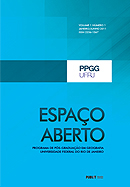Use of Social Cartography for Analysis of Social-Environmental Perception: a Case Study in the Paraíba do Sul Watershed – São Paulo Stretch
DOI:
https://doi.org/10.36403/espacoaberto.2024.60503Keywords:
Social Cartography, Social-Environmental Perception, Participatory Methodology, Geographic Information SystemAbstract
The Social Cartography involves the inclusion of communities in the map development process and enables the establishment of an important participatory methodology for qualitative-quantitative analyses of socio-environmental perception, contributing to the construction of collective knowledge and territorial management. The objective of the article is to present the use of Social Cartography as a tool for analyzing socio-environmental perception in the Paraíba do Sul River basin, Paulista section. The analysis was carried out by Social Cartography, based on the survey of socio-environmental potentialities and problems, and their comparison with data from secondary sources. Native vegetation, conservation units, and tourist attributes stood out as potentialities; and concerning socio-environmental problems, eucalyptus monoculture, precarious sanitation, urban occupation, and sand extraction were highlighted. The results reinforce the
potential of Social Cartography in bringing visibility to local knowledge and contributing to the construction of collective knowledge and the participatory territorial diagnosis.
Downloads
Downloads
Published
How to Cite
Issue
Section
License
Copyright (c) 2024 Jocilene Dantas Barros, Gustavo Felipe Balué Arcoverde, Raquel Henrique

This work is licensed under a Creative Commons Attribution-NonCommercial-ShareAlike 4.0 International License.



